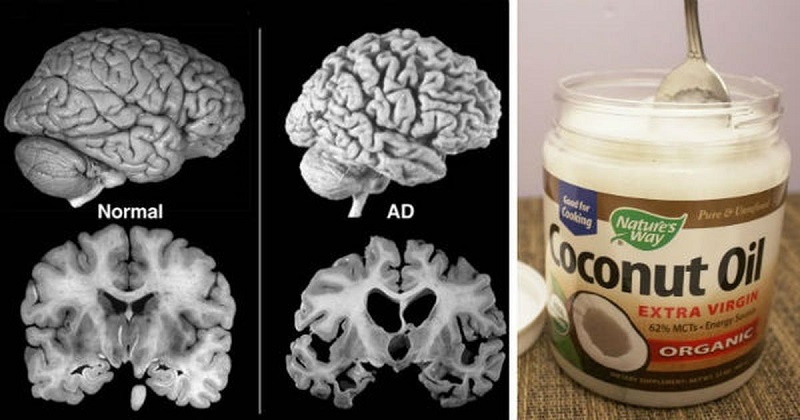Imagine what it’d be like if one of your loved ones suffered from Alzheimer’s disease.
Would you help them get part of their personality and memory back?
Well, that’ exactly what happened to Dr. Mary T. Newport, a pediatrician, when her husband developed the disease in his early fifties.
Dr. Newport’s husband, Steve, had been already suffering from dementia for five years before an MRI finally diagnosed him with Alzheimer’s. By this point, Steve was a pretty dire state.
“Many days, often for several days in a row, he was in a fog; couldn’t find a spoon or remember how to get water out of the refrigerator… One day I would ask if a certain call came that I was expecting and he would say ‘No.’ Two days later he would remember the message from so-and-so from a couple of days earlier and what they said.”, said Dr. Newport.
Steve’s frontal and parietal lobes, as well as his amygdala and hippocampus, were damaged and atrophied. Despite the fact that his short-term memory was virtually non-existent, Steve was still capable of calling new information days after the fact. His wife had a feeling that his condition may have had a lot more to do with what he was eating than what his doctors lead on.
Steve took the medication his doctor recommended with little to no effect. He became depressed and lost weight. He eventually lost the ability to run and developed a strange gait and tremors.
Soon enough, his wife took matters into her own hands, extensively researching clinical trials and alternative healing options in the hope of helping her husband regain some of his faculties.
One of the drugs she found, Ketasyn (AC-1202), displayed the ability to stop the progression of Alzheimer’s in half of tested patients within 90 days of first taking the drug. Researching the drug more closely, Dr. Newport discovered that its active ingredient was simply MCT (medium chain triglycerides) oil. Coincidentally, the compound naturally occurs in coconut oil.
All this time, the miracle drug she had been waiting for could be purchased at her local health food store.
And so, Dr. Newport began feeding her husband 2 tablespoons of coconut oil twice a day, combining it with his food. Within 2 months, he became a lot more alert, happy, and talkative. His tremors also visibly diminished. Within a year of treatment, Steve could recognize distant family members, actively hold a conversation and even go back to enjoying long walks and runs around the neighborhood.
Most surprisingly, Steve had regained the ability to read, which is almost unheard of in patients with Alzheimer’s disease. Although he’s not yet back to his pre-Alzheimer’s self, Dr. Newport is confident that her husband still has the potential to improve.
She adds, “For now, we are very pleased with where he is at and should coconut oil stop or slow down the progress of his disease, it will be worth every drop that he takes.”
How Coconut Heals Alzheimer’s
Your brain is an incredibly energy-hungry organ, consuming up to 60% of the glucose you supply your body.
However, a diseased brain can’t get all the glucose it needs because it experiences hypometabolism, resulting in impaired cognitive function and, eventually, cognitive decline.
Ketones, which are byproducts of the breakdown of fats in the body, are an effective alternative energy substrate for the brain. They can even help restore and renew neurons and nerve function in your brain, even after damage has set in.
“In Alzheimer’s disease, the neurons in certain areas of the brain are unable to take in glucose due to insulin resistance, and slowly die off… if these cells had access to ketone bodies, they could potentially stay alive and continue to function,” explains Dr. Newport.
Ketones are typically only present in your body after extensive periods of starvation, but MCTs are oxidized by the liver and immediately give rise to ketone bodies. Roughly 97% of the dietary fats you consumed every day are long-chain triglycerides, which have 14-18 carbons. Medium-chain triglycerides, on the other hand, have between 6-12 carbons.
Coconut oil is also being studied as a potential treatment for Parkinson’s disease, Huntington’s disease, multiple sclerosis, drug resistant epilepsy, and diabetes.
Growing Evidence
A 2004 study published in the journal Neurobiology of Aging found that coconut oil almost immediately improved cognitive function in older adults with memory disorders. The controlled study involved 20 patients suffering from Alzheimer’s disease of other forms of cognitive decline who were given either coconut oil or a placebo. Within 90 minutes of treatment, the coconut oil group experienced an increase in Beta-hydroxybutyrate (beta-OHB (the primary ketone used by your body)).
All the patients observed had been fasting since the night before and had their blood drawn before the coconut oil treatment, after 90 minutes of rest, and after a 30-min cognitive testing session. The coconut oil group also experienced greater results in the cognitive test. All this after a single 40ml dose!
Dr. Mercola reports that neurologist Dr. David Perlmutter believes that fat avoidance and carbohydrate over-consumption are at the heart of the Alzheimer’s epidemic and that the disease is entirely preventable and driven by lifestyle factors.
Both suggest that intermittent fasting should be used alongside coconut oil treatment to metabolize the glycogen stores in your liver and shift to burning stored fat and reach a ketogenic state. This state can help you lose weight and keep your brain sharp, but it can also be incredibly dangerous: as ketone levels rise, the acidity of the blood also rises, leading to ketoacidosis, a serious condition that can prove fatal. It’s also important to avoid sugar and gluten and feed your gut flora.
